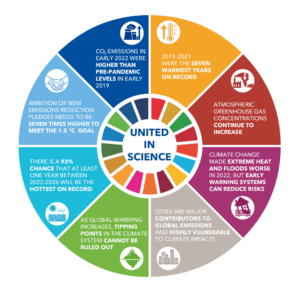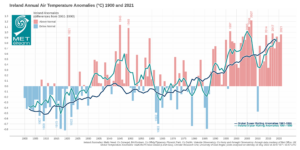United in Science: “We are heading in the wrong direction”
The WMO have released a multi-agency United in Science report. The report provides an overview of the most recent science related to climate change, impacts and responses, focusing on greenhouse gases, global temperatures, climate predictions and tipping points, urban climate change, extreme weather impacts and early warnings.

United in Science – Key messages
Key messages include:
- Levels of atmospheric carbon dioxide (CO2), methane (CH4) and nitrous oxide (N2O) continue to rise and Global fossil CO2 emissions in 2021 returned to the pre-pandemic levels.
- New national mitigation pledges are insufficient. The ambition of these new pledges would need to be four times higher to get on track to limit warming to 2 °C and seven times higher to get on track to 1.5 °C.
- Collectively, countries are falling short of meeting their new or updated pledges with current policies.
- The most recent seven years, 2015 to 2021 were the warmest on record. The 2018–2022 global mean temperature average is estimated to be 1.17 ± 0.13 °C above the 1850–1900 average.
- The annual mean global near-surface temperature for each year from 2022-2026 is predicted to be between 1.1 °C and 1.7 °C higher than pre-industrial levels (1850-1900).
- There is a 93% probability that at least one year in the next five will be warmer than the warmest year on record, 2016, and that the mean temperature for 2022–2026 will be higher than that of the last five years.
- Global warming during the 21st century is estimated (with 66% probability) at 2.8 °C (range 2.3 °C–3.3 °C), assuming a continuation of current policies, or 2.5 °C (range 2.1 °C–3.0 °C) if new or updated pledges are fully implemented.
- The number of weather, climate and water-related disasters has increased by a factor of five over the past 50 years.
- In June and July 2022, Europe was affected by two extreme heatwaves and drought. Portugal had a new July national temperature record of 47.0 °C, and for the first time on record, temperatures in the UK exceeded 40 °C. According to the World Weather Attribution initiative, human-caused climate change made the heatwave in the UK at least 10 times more likely.
Tipping Points in the Climate System – Further research on tipping points will be crucial to help society better understand the costs, benefits and potential limitations of climate mitigation and adaptation in the future.
- Recent research suggests Atlantic Meridional Overturning Circulation (AMOC) may be weaker in the current climate than at any other time in the last millennium.
- The melting of the polar ice sheets on Greenland and Antarctica is also considered a major tipping point and would have global consequences due to substantial additional sea-level rise for hundreds to thousands of years.
- The combined effects of higher temperatures and humidity in some regions could reach dangerous levels in the next few decades, with physiological tipping points or thresholds beyond which outdoor human labour is no longer possible without technical assistance. Full Report here.
Observations in Ireland are generally consistent with the global situation. Measurements going back over the past 120 years have shown that the annual average air temperature in Ireland is also trending upwards, with an increase of 0.96 °C over the last 120 years. Recently, summer 2022 saw both the July and August Irish maximum daily temperature records being broken and the fifth consecutive season where all synoptic stations observed above average mean temperatures. See more in our summer 2022 Climate Statement.

Provisional Long Series Temperature Anomalies for Ireland. Long-term average (LTA) period 1961-1990.